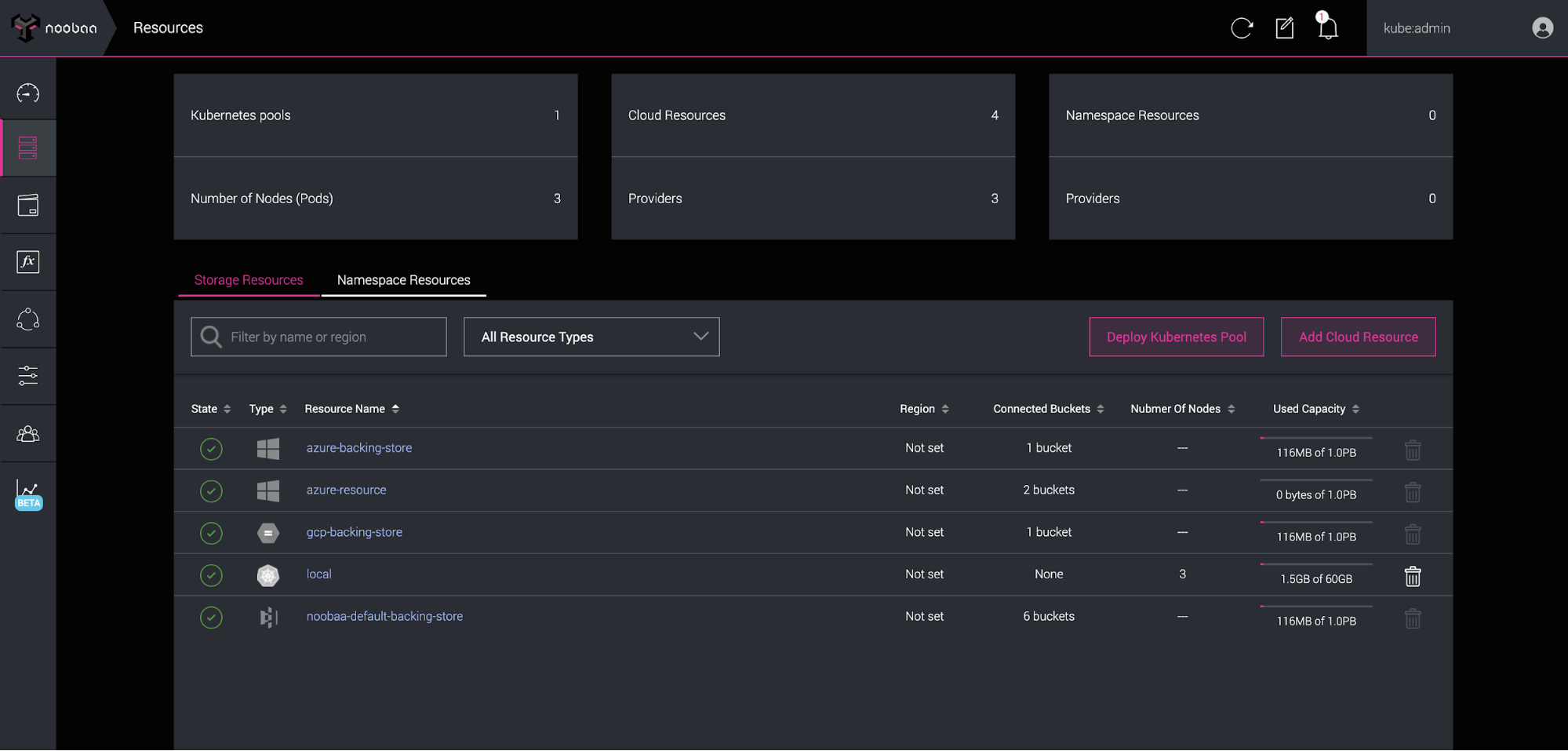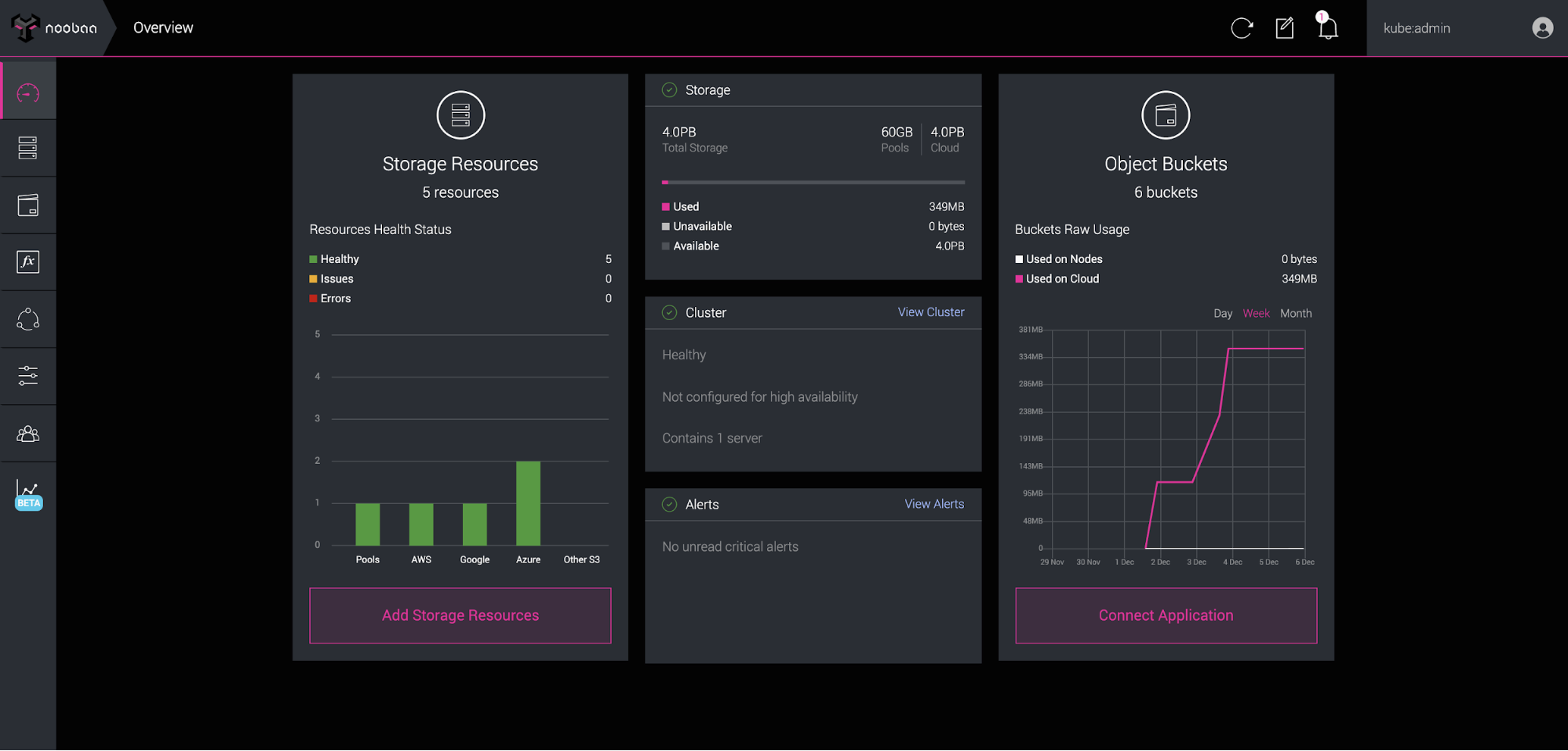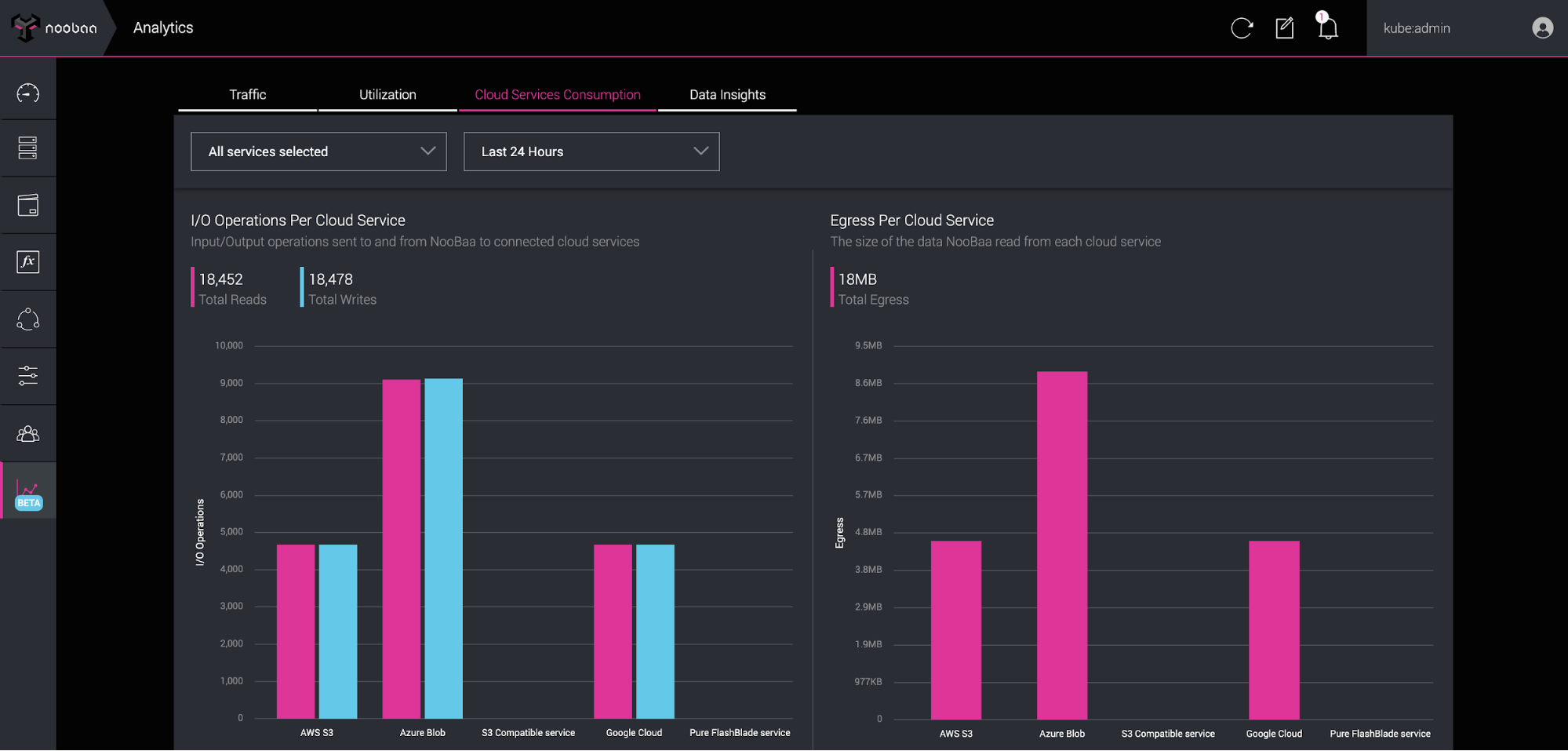Red Hat ブログ
We are excited to announce a new Operator—the NooBaa Operator for data management. The NooBaa Operator is an upstream effort that Red Hat is leading and is included as part of the features of the upcoming Red Hat OpenShift Container Storage 4, currently released for Early Access.
Operators are design patterns that augment and implement common day one and day two activities with Kubernetes clusters, simplifying application deployments and empowering developers to focus on creation versus remediation.
Managing data across clusters, data centers, and cloud providers at scale is complex and challenging. The NooBaa Operator is designed to automate the packaging, deployment, management, upgrading, and scaling of NooBaa data management software in a container environment. This Operator provides lightweight object storage that starts lean with a single container to serve local projects and workload, and can scale to enable hybrid and multi-cloud data management in Kubernetes clusters.
The NooBaa Operator helps simplify data management for application developers and delivers self-service object storage S3 APIs, enabling them to focus on writing and testing code without worrying about the infrastructure underneath. Applications will work the same way on-prem with S3-compatible object storage like Ceph, on AWS, Azure or Google Cloud without changing a single line of code. The NooBaa Operator brings agility to administrators, so they can start fast wherever they are installed, and move the data later on, easily and transparently to the applications. NooBaa virtualizes backing storage with an S3 compatible API, regardless of the location while taking into account the administrator’s day to day challenges.
The Evolution of Data Services for Cloud Native Application EcoSystems
Red Hat continues to innovate and prepare for the future of the enterprise, as evidenced by the evolution of Red Hat OpenShift and the release of the Rook-Ceph storage Operator. Red Hat OpenShift Container Storage, like the rest of the OpenShift portfolio, is evolving to better meet the needs of cloud-native applications. Organizations want the freedom to work anywhere and deploy the workload to wherever they needed. The NooBaa Operator is designed to provide the data mobility that would allow applications extended mobility.
The NooBaa Operator is an upstream project for the upcoming release of Red Hat OpenShift Container Storage 4. Red Hat OpenShift Container Storage 4 combines Rook-Ceph and multi-cloud gateway technology from Red Hat’s acquisition of NooBaa in November 2018.
Benefits and Features of the NooBaa Operator
The NooBaa Operator community release enables open source developers to get an immediate lightweight object storage service for Kubernetes and includes a number of features.
Cloud-Native Storage Orchestration Anywhere
NooBaa’s Kubernetes Operator deploys the NooBaa core to deliver a self-managed, self-scaling, and self-healing object storage infrastructure regardless of its backing storage. It helps automate deployment, bootstrapping, configuration, provisioning, scaling, upgrading, migration, monitoring and resource management across multiple public cloud providers.

Stretched single namespace
NooBaa provides a single namespace that can be stretched across geographic locations, clusters, and public cloud providers. Each application can consume its data in its preferred location.

Operational Agility
NooBaa frees operation teams from long-term planning and provides the flexibility to use S3 compatible backing storage for a consistent service with the cloud-native S3 API. With NooBaa there are no hard storage decisions, and operations is able to change the actual data location with continuous service for the application during its lifecycle.
Keep development focused on the application
NooBaa’s Operator introduces an S3 bucket claim mechanism that allows for zero infrastructure awareness. The bucket claim mechanism automatically creates buckets and accounts with predefined data placement policies, which are immediately accessible to the application when it starts running.
Data Protection by design
NooBaa enforces, by default, data encryption with a separation between keys management and the data, providing ultimate data protection on-premise and in the cloud. NooBaa also supports an optional Server-Side Encryption which adds an additional security layer on top of the default data protection. NooBaa tags each object with a fingerprint, and periodically validates the fingerprint of its data and rebuilds it if suspected as untrusted.
Data Efficiency by design
Dataset mobility is not only challenging for the control plane, but also the network. NooBaa simplifies mobility requirements by applying inline deduplication and compression, which minimizes the network utilization for replication, mirroring, rebuild, and more. NooBaa also chunks every object into multiple fragments to allow for efficient data mirroring streams.
Data Mirroring across cloud-native storage providers
NooBaa provides a second layer of durability on top of the backing storage, which is the first layer. DevOps administrators have the option to mirror data across regions, clusters and cloud providers for high availability and location based optimizations.
Data mobility simplified
Deploying the NooBaa Operator on-premises helps to start development projects on-premises and enables cloud-first development. Once deployed, Operations can use NooBaa to empower data mobility by extending NooBaa to use cloud native storage on both public and private cloud providers.
Operations teams can now scale or burst to the cloud, as well as shrink or extend the data to wherever it’s needed.
Modern UI
The NooBaa Operator for Kubernetes introduces a modern UI for monitoring data consumption across applications, as well as for advanced configuration for event driven triggers for data scrubbing, data migration and more. The NooBaa Operator also exports Prometheus metrics for external dashboards like Grafana.

Upstream Community First
Red Hat continues to believe in and practice community-driven upstream development, which is why we have released the NooBaa Operator for data management to the community. Red Hat also participates in the Cloud Native Computing Foundation (CNCF), OpenShift Commons and other instrumental cloud-native upstream projects, including Kubernetes, Rook, Ceph, and Prometheus. We're excited to work with the larger community on the technological evolution of container native storage.
Getting started with NooBaa
Red Hat encourages community involvement in all of its projects. To get involved with NooBaa, visit:
執筆者紹介
Karena Angell is OpenShift Product Manager, Cloud Paks.

